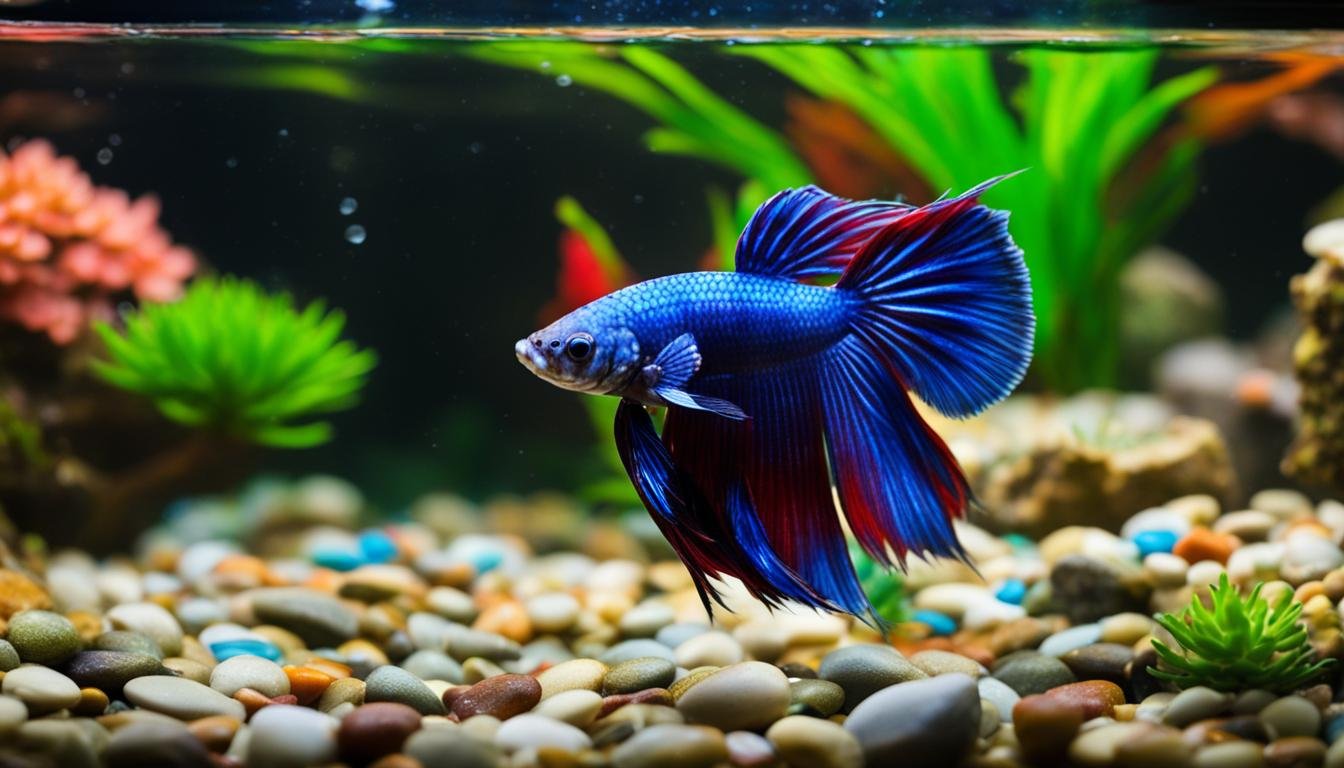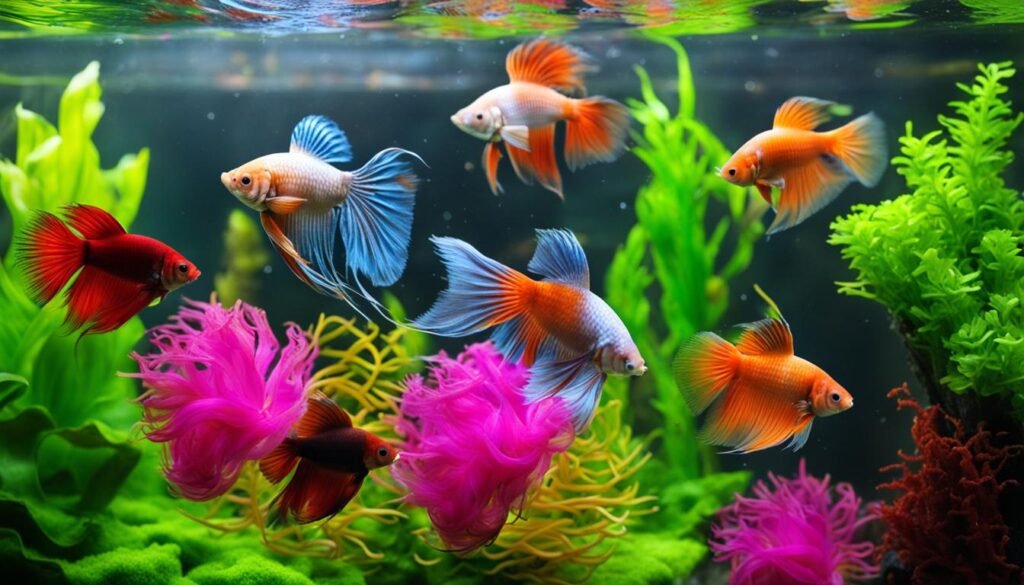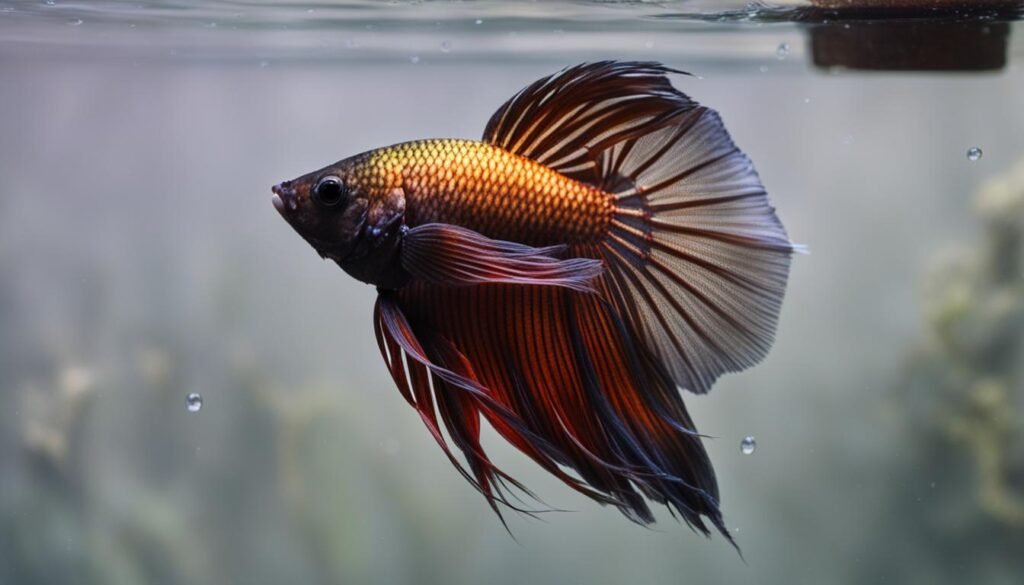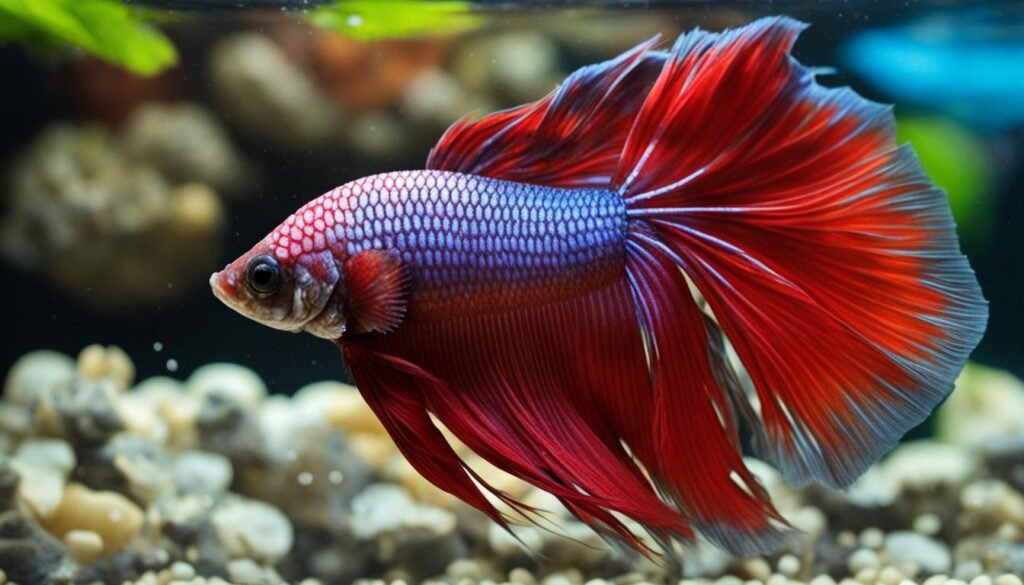Your cart is currently empty!

Can Betta Fish Eat Shrimp? Your Guide to Betta Diets
Are you wondering if your betta fish can eat shrimp? Well, you’ve come to the right place. In this guide, we’ll explore the compatibility between betta fish and shrimp, and whether shrimp can be a part of a betta fish’s diet.
Betta fish are natural carnivores, and they typically feed on small invertebrates. Shrimp, being small invertebrates, can be potential prey for bettas. However, whether a betta fish can eat shrimp depends on its individual behavior. Some bettas may pick off a few shrimp here and there, while others may leave the shrimp alone or even cause harm to them. To determine if shrimp are suitable for your betta, it’s crucial to observe their behavior closely.
Keeping a colony of cherry shrimp in a betta tank can have its advantages. These shrimp can help maintain water quality by consuming leftover food and detritus. However, it is important to provide a well-decorated tank with hiding places and enough space for both the betta fish and shrimp to thrive. There are also other types of shrimp, such as different colors of Neocaridina shrimp, Amano shrimp, and ghost shrimp, that can coexist with bettas. However, it’s important to consider the size of the shrimp and their compatibility with the betta fish.
Key Takeaways:
- Whether betta fish can eat shrimp depends on the individual fish’s behavior.
- Observing your betta’s behavior is crucial to determine if shrimp are compatible with them.
- Cherry shrimp can help maintain water quality in a betta tank.
- Provide a well-decorated tank with hiding places for both the betta fish and shrimp.
- Consider the size and compatibility of other shrimp species with bettas.
What Do Betta Fish Eat?
Betta fish are carnivores and require a diet that is high in protein. The mainstay of their diet should be betta pellets, specifically formulated for their nutritional needs. These pellets should contain high-quality animal-based proteins and should not have fillers such as soy or rice.
Freeze-dried and frozen foods, such as brine shrimp and bloodworms, can be given as occasional treats to provide variety in their diet. These foods can be a great source of nutrients and can mimic the betta’s natural prey. However, it is important to feed them in moderation to prevent any digestive issues.
Live foods, such as daphnia and wingless fruit flies, can also be provided to betta fish. These live foods can stimulate their hunting instincts and provide exercise. Live foods should be sourced from reputable sources or cultured at home to ensure they are free from parasites and diseases.
Here are some key points to remember about feeding betta fish:
- Feed betta pellets as the main diet, ensuring they contain high-quality animal-based proteins.
- Occasionally offer freeze-dried or frozen foods like brine shrimp and bloodworms as treats.
- Include live foods, such as daphnia and wingless fruit flies, to provide variety and simulate their natural environment.
- Feed in moderation to prevent overeating and digestive issues.
Providing a Varied Diet for Betta Fish

When it comes to keeping our betta fish healthy and thriving, providing them with a varied diet is essential. Just like us, bettas need a balanced and diverse menu to ensure they receive all the necessary nutrients for optimal health. By offering different types of food, we can mimic their natural diet and promote their overall well-being.
The Betta Fish Feeding Schedule
Creating a feeding schedule for our betta fish can help establish a routine and ensure they are getting the right amount of food. It’s recommended to feed adult bettas once or twice a day, offering only as much food as they can consume in a couple of minutes. Overfeeding can lead to obesity and poor water quality, so it’s important to be mindful of portion sizes. Additionally, incorporating a day or two of fasting each week can help prevent overeating and promote proper digestion.
Betta Food Types
There are various types of food available for betta fish, each offering unique benefits. Flakes and pellets are the most common staple foods and provide a good base for their diet. These foods are nutritionally balanced and contain essential nutrients. However, to provide a more varied diet, we can also include freeze-dried, frozen, and live foods. Freeze-dried options like brine shrimp and bloodworms can be given as occasional treats, while frozen and live foods like daphnia and wingless fruit flies can simulate their natural hunting behavior and add excitement to their meals.
Ensuring a Well-Rounded Diet
To ensure our betta fish receive a well-rounded diet, it’s important to rotate different types of food each day. This not only prevents dietary deficiencies but also keeps their feeding experience interesting and engaging. Incorporating a mix of flakes, pellets, freeze-dried, frozen, and live foods can provide a wide range of nutrients and flavors. Remember to choose high-quality options that are specifically formulated for bettas to ensure their dietary needs are met.
Selecting the Right Food for Betta Fish
When it comes to providing the best nutrition for your Betta fish, selecting the right food is crucial. Betta fish are carnivores and require a diet that is high in protein to support their growth, coloration, and overall health. Here are some key factors to consider when selecting the perfect food for your Betta:
High Protein Betta Fish Food
Betta fish thrive on a diet rich in high-quality animal-based protein. Look for fish foods that list shrimp, krill, or other animal proteins as the primary ingredients. These protein sources provide essential amino acids that bettas need for optimal growth and development. By choosing foods with high protein content, you can ensure that your Betta fish gets the nutrients they require for a healthy and vibrant life.
Avoiding Fillers in Betta Fish Food
Fillers such as soy or rice are commonly found in some inexpensive betta fish foods. These fillers offer little to no nutritional value for your fish and can lead to bloating and digestive issues. To ensure your Betta gets the best possible diet, opt for foods that are free from fillers and contain only high-quality ingredients.
Importance of Fish Meal for Betta Fish
Fish meal is a common ingredient in many betta fish foods. However, not all fish meals are created equal. Look for fish meal that is sourced from high-quality, sustainable fish. This ensures that your Betta is getting the necessary nutrients without any unwanted contaminants. A fish meal of superior quality provides the essential vitamins, minerals, and omega-3 fatty acids that promote a strong immune system and vibrant colors in Betta fish.
By selecting a high protein betta fish food, avoiding fillers, and choosing fish meal of the highest quality, you can provide your Betta fish with the nutrition they need to thrive. Remember to always follow the feeding guidelines on the packaging and monitor your Betta’s health and appetite to ensure they are receiving a balanced diet. With the right food, your Betta fish will flourish and bring joy to your aquarium.
Reasons Why Betta Fish may Not Eat

When it comes to betta fish, they may sometimes exhibit a loss of appetite for various reasons. It’s important to understand these reasons to ensure the health and well-being of your betta. Here are some common factors that can contribute to a betta fish not eating:
- Betta Fish Stress: Stress can greatly affect a betta fish’s appetite. Changes in their environment, such as fluctuations in water temperature or sudden tank cleaning, can cause stress and lead to a loss of appetite.
- Recent Environmental Changes: If you’ve recently made changes to your betta fish’s tank, such as adding new decorations or rearranging the layout, it may take them some time to adjust. During this period of adjustment, they may not feel comfortable eating.
- Betta Fish Illness: If your betta fish is showing signs of illness, such as lethargy, fin rot, or unusual behavior, it’s possible that they may not have an appetite. Illness can affect their overall energy levels and desire to eat.
It’s important to monitor your betta fish closely and look for any signs of distress or illness. If your betta fish consistently refuses to eat or exhibits other concerning symptoms, it is recommended to consult a veterinarian or an expert in betta fish care for proper diagnosis and treatment.
Summary:
Loss of appetite in betta fish can be attributed to stress, recent environmental changes, or illness. It’s crucial to provide a comfortable and stable environment for your betta fish to minimize stress. Monitor their behavior closely and seek professional advice if they consistently refuse to eat or show signs of illness. By addressing these issues promptly, you can help ensure the well-being of your betta fish.
Preventing Overeating in Betta Fish

Betta fish, like any other pet, can be prone to overeating if not properly monitored. Overfeeding your betta fish can lead to various issues such as bloating, digestive distress, obesity, and poor water quality. Therefore, it is essential to take measures to prevent overeating and ensure the overall health and well-being of your betta fish.
Feeding Portion Control
One of the key factors in preventing overeating is controlling the portion size of each feeding. It is important to feed your betta fish the recommended daily amount of food and avoid excess feeding. The general guideline is to feed them two to four pellets once or twice a day. Remember, betta fish have small stomachs and can easily become overfull, so it’s better to underfeed slightly rather than overfeed.
Monitoring Feeding Behavior
Observing your betta fish’s feeding behavior can give you important insights into their eating habits. If they are gobbling up all the food within seconds, it might be an indication that you are feeding them too much. On the other hand, if they show disinterest in their food or leave it uneaten, it could be a sign of overfeeding in the past. Adjusting the portion sizes based on their feeding behavior can help prevent overeating and promote a healthy appetite.
Maintaining Water Quality
Overfeeding can have a direct impact on the water quality in your betta fish’s tank. Excess food that is left uneaten can break down and release harmful compounds into the water, leading to poor water quality and potential health issues for your fish. To maintain optimal water quality, make sure to clean out any uneaten food promptly. Regular water changes and proper filtration are also crucial in preventing water contamination and maintaining a healthy environment for your betta fish.
In conclusion, preventing overeating in betta fish is essential for their overall well-being. By controlling the feeding portion, monitoring their feeding behavior, and maintaining water quality, you can ensure that your betta fish stays healthy and happy. Remember, a balanced and controlled diet is key to providing your betta fish with the nutrition they need without risking overeating and related issues.
Conclusion
In conclusion, providing a proper diet for your betta fish is crucial for their overall health and well-being. As carnivores, bettas require a diet that is high in protein to thrive. The mainstay of their diet should be betta pellets, specifically formulated to meet their nutritional needs.
It is also important to supplement their diet with occasional treats of freeze-dried or frozen foods, such as brine shrimp or bloodworms, to provide variety and mimic their natural environment. However, these treats should be given in moderation to prevent bloating and digestive issues.
By observing their feeding behavior and ensuring they receive the recommended portion sizes, you can prevent overeating and maintain their optimal health. Additionally, taking steps to maintain water quality by removing excess food and avoiding overfeeding is crucial for the well-being of your betta fish.
With the right diet and care, your betta fish can live a long and healthy life. We hope this betta fish food guide has provided you with the necessary information to meet your betta’s dietary needs and ensure their happiness. Remember, a healthy diet is key to a thriving betta fish!
FAQ
Can betta fish eat shrimp?
Betta fish are naturally carnivores and can potentially eat shrimp. However, whether they will eat shrimp or not depends on the individual fish’s behavior. Some bettas may pick off a few shrimp, while others may leave them alone or cause harm. It’s important to observe your betta’s behavior and have a backup plan.
What do betta fish eat?
Betta fish require a diet that is high in protein. The mainstay of their diet should be betta pellets, specifically formulated for their nutritional needs. They can also be given freeze-dried and frozen foods as occasional treats.
How can I provide a varied diet for betta fish?
It’s important to provide different types of food such as flakes, pellets, freeze-dried, frozen, and live foods. Rotating different types of food each day and allowing for a day or two of fasting can help prevent overeating and promote proper digestion.
What should I consider when selecting food for betta fish?
Look for foods that are high in protein and specifically formulated for betta fish. Ingredients such as shrimp, krill, and other animal-based proteins are beneficial. Avoid foods with fillers like soy or rice, as they can lead to bloating.
Why is my betta fish not eating?
Betta fish may refuse to eat due to various reasons, including stress, recent environmental changes, or illness. It’s normal for bettas to skip a meal or two without immediate concern. However, consistent refusal to eat or signs of illness should be addressed by a veterinarian or expert.
How can I prevent overeating in betta fish?
Overfeeding can lead to bloating, digestive distress, obesity, and poor water quality. Feed betta fish the recommended daily amount of food and remove any uneaten food. Fasting them for a day or two can help alleviate bloating and promote proper digestion.
Leave a Reply